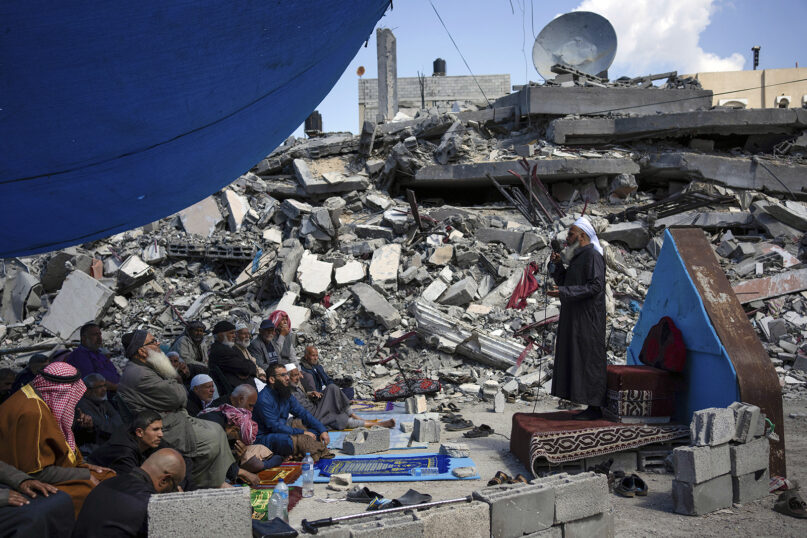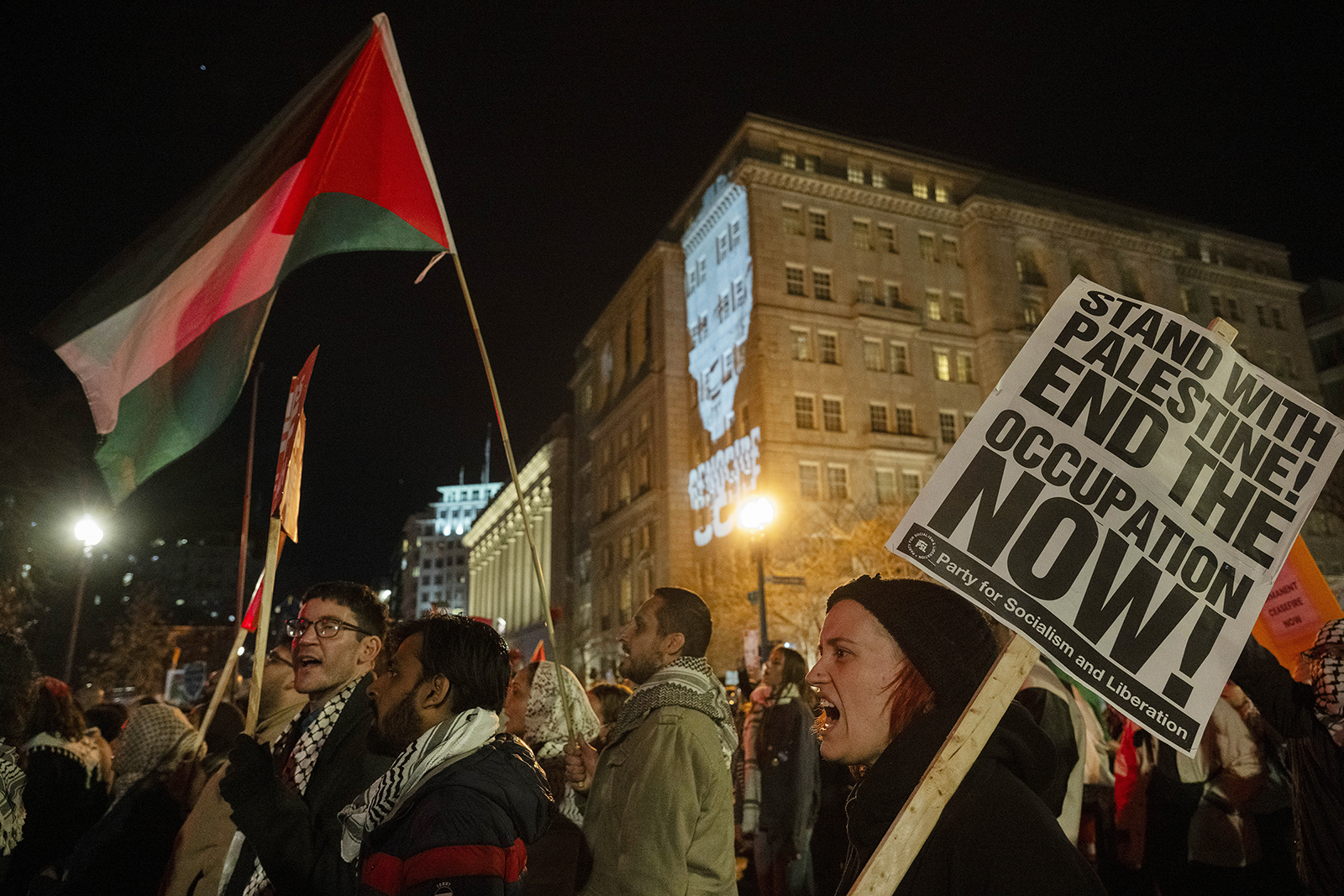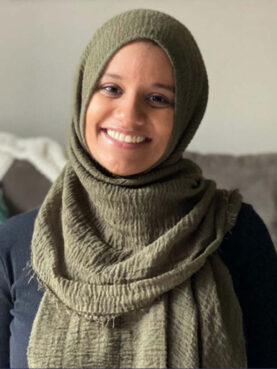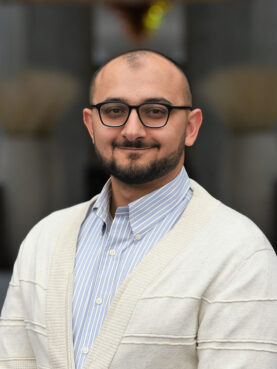'Ramadan is not the month of taking a break or relaxation. It is a month of action and organization for us as an organization and as a community,' said an activist. 'We hope Ramadan will be a reinvigoration of the work we have been doing over the last five months.'

Palestinians pray in front of a mosque destroyed by the Israeli airstrikes in Rafah, Gaza Strip, Friday, March 8, 2024, ahead of the holy Islamic month of Ramadan.
(AP Photo/Fatima Shbair)
March 8, 2024
By Rhonda Roumani
(RNS) — Every weekend during the month of Ramadan for the past six years, tens of thousands of Muslims have flocked to Dearborn, Michigan, to attend a late-night Suhoor Festival, named for the meal eaten before the daylong fast starts during Ramadan.
From 10 p.m. until 3 a.m., the festival’s attendees, who will fast from food and water once the sun comes up, spend the pre-dawn hours eating and drinking with family and friends from specialty food trucks and shopping in the warmth of vendors’ heated tents. The joyous occasion has become a hallmark of Dearborn life, where more than half the residents are Arab Americans.
But this year, in light of the war and starvation taking place in Gaza, as well as Muslim-majority countries such as Yemen and Sudan, the organizers of the festival have scaled it down, rebranding it as “Suhoor for Humanity.”
“This year, we are not looking to be festive, but to bring people together for a good cause,” said Ali Sayed, owner of Hype Athletics, a youth center in Dearborn Heights where the rebranded event will take place. A handful of food trucks and vendors will be on-site, but organizers are focused on raising money for three charities that provide aid to Palestine, Yemen and Lebanon, which is currently facing a devastating financial crisis.
RELATED: Once marginalized, New York’s Muslims celebrate growing political influence on Muslim Day
They are also hoping to add spiritual and religious speakers to their roster of events this year. “We are hurt and devastated by the atrocities taking place in Palestine, and the city as a whole is hurt and torn by it all, especially with the lack of trust and support by our government.”
As Israel’s war on Gaza enters its sixth month, Muslim Americans are struggling to make sense of the level of death, destruction and displacement that has befallen Gaza, with more than 85% of the population forced from their homes and more than 31,000 Palestinians killed, according to local authorities, including an estimated 13,000 children.

Protesters rally near the White House demanding a permanent cease-fire and end to U.S. funding to Israel, on Wednesday, March 7, 2024, in Washington. (AP Photo/Kevin Wolf)
They are angry, too, at President Joe Biden’s and other American politicians’ slowness in calling for a cease-fire or even initially in acknowledging the loss of life. Many have stopped watching mainstream media and instead are livestreaming graphic images posted by Palestinian and other citizen journalists, which have left them feeling raw and demoralized.
“People are crying, trying to make sense of it all,” said Hanan Hashem, an assistant professor of clinical psychology at William James College in Boston and a community educator at the Family & Youth Institute, which focuses on mental health among young Muslims. “They’re finding it very difficult to function, very difficult to show up in class, to pay attention, to finish their assignments, to have conversations with their coworkers, to show up to meetings.”
Hashem, whose family hails from Yemen, said the closer they are to people in the conflicts, the more trauma they suffer and the harder it is to know how to respond.
The holy month of Ramadan, experts say, might be arriving just as these Muslims need it most. The most sacred time of the year, Ramadan is a time for reflection and deep prayer, and mosques are often buzzing with people gathered to recite the Quran. It is also a time to highlight Muslim values of selflessness and philanthropy and of unity: Besides refraining from food and drink, Muslims are to abstain from fighting and gossip.

Hanan Hashem. (Courtesy photo)
These disciplines tend to focus participants on their spiritual goals. Hashem and others have been looking to popular imams to explain how to use Ramadan’s time of discipline and prayer to turn Muslims’ empathy for those caught in the war zone into action.
“Ramadan is not the month of taking a break or relaxation. It is a month of action and organization for us as an organization and as a community. We hope to gain more from the momentum of Ramadan,” said Taher Herzallah, director of outreach and grassroots organizing for American Muslims for Palestine. “We hope Ramadan will be a reinvigoration of the work we have been doing over the last five months.”
Since October, Herzallah, whose family is from Gaza, has lost nine close relatives to the war. Family members who have survived so far have been detained and stripped naked. His elderly aunts, he said, are “stuck in a starvation apocalyptic scenario.”
Yet Herzallah said the war has inspired a level of activism beyond any he’s seen in 15 years as an organizer. Muslim groups have led and organized mass protests, organized national phone bank trainings and urged city governments around the country to adopt cease-fire resolutions. Pro-Palestinian campus groups have reignited boycott Israel movements, and Muslims have been instrumental in convincing Democratic primary voters to mark their ballots “uncommitted” as a show of protest against Biden’s pro-Israel stance.
Over the last few months, AMP has also organized national marches, built coalitions with non-Muslim groups to shut down highways and demonstrated outside military suppliers’ offices and factories.

Taher Herzallah. (Photo courtesy American Muslims for Palestine)
“I’ve never seen it where old khaltos (aunts) in the community are calling to ask me, ‘If we protest at the mall, will we get arrested?’” said Herzallah. “My kids even went to a kids’ protest for Gaza. Never seen this level of engagement from all segments of our community.”
Some of their activism in recent weeks has been oriented toward Ramadan. As it is traditional to break their day’s fast by eating the Middle Eastern fruit dates, following a practice of the Prophet Muhammad (Muslims are major consumers of dates in the United States), American Muslims for Palestine’s annual campaign to boycott dates grown in Israel is getting a “huge response” this year, said Herzallah.
Activists are also using Ramadan worship and other gatherings as venues to reach Muslims. AMP is sending people to 29 mosques across the country during the Taraweeh, the late evening prayers that draw Muslims to their mosques during the month, to talk about Palestine and the work that they are doing.
RELATED: Jerusalem Palestinians prepare for Ramadan amid holy month’s uneasy politics
Hashem believes the war has caused Muslims from different racial and ethnic groups to bridge their cultural divides. “Muslims are paying more attention to the ways that a lot of our oppression is connected,” she explained. “People are paying attention to Congo,” referring to fighting between armed groups in eastern Democratic Republic of the Congo that has devolved into indiscriminate violence against the Muslim minority. “People are paying attention to what’s happening here in America towards marginalized communities.”
In New Haven, Connecticut, Salwa Abdussabur, a Black Muslim, is the founder of Black Haven Arts and Culture, an art and activism collective that released a statement in late December denouncing “the ongoing atrocities and genocide unfolding in Palestine.”
Now Abdussabur is hoping Ramadan will inspire the Muslim community to channel its spiritual power for change. Since taking a phone bank training with Celebrate Mercy, an Ohio-based Muslim charitable and educational organization, she has joined with CT Muslims and Friends for Palestine, a TikTok group of Muslims of all ethnic and racial backgrounds, to make daily calls to public officials, advocating for peace in Gaza.
. “This is a month of miracles,” Abdussabur said.
No comments:
Post a Comment